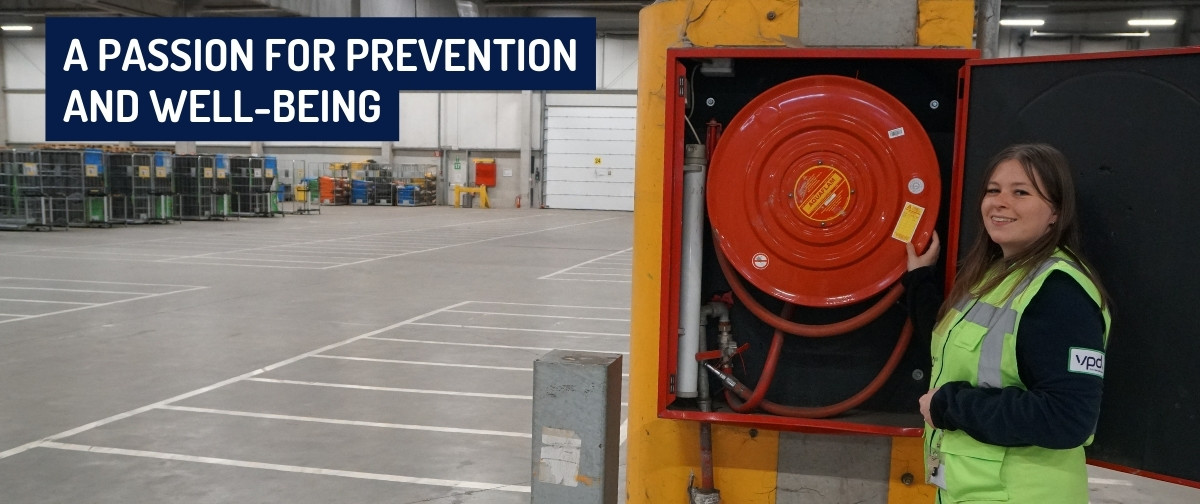How did you happen to join VPD?
Wendy: I have always had a passion for prevention and well-being. Initially, I wanted to become a police officer, which is why I pursued a degree in Integrated Security. After my studies, I started working as a security guard at the airport, then spent several years in a temp agency, first as an HR consultant, then as a Safety Officer. Eventually, I decided to seek a job as a prevention advisor, which led me here.
What exactly does your job as a prevention advisor entail?
Wendy: My job is very varied: it ranges from environmental issues to psychosocial well-being, fire safety, office ergonomics, and even waste management. Based on a five-year global prevention plan, I develop an annual action plan with various priorities. This allows us to keep a good overview.
We work according to the "dynamic risk management system" (DRMS), where I continuously look for improvements. I also conduct risk analyses and examine how we can prevent workplace accidents.
Always room for improvement
What was your first impression when you started here?
Wendy: When I started here, I noticed that many things were already working well, but there is always room for improvement. I had no experience in the transport sector, so I am learning a lot, for example, about batteries for electric vehicles. The basics are the recurring annual legal obligations, such as inspecting fire extinguishers and organising and coordinating fire drills. There is a lot of follow-up work, but at the same time, we also look at how things can be improved.
You mentioned the electrification of the fleet. How does this affect your work as a prevention advisor?
Wendy: Transport is a specific sector. The electrification of our fleet brings new safety challenges. It is important that the charging stations for electric vehicles are placed in safe locations and meet all safety standards. Through this experience, I will deepen my knowledge of electricity.
A good sense of humor
How do you manage collaboration with different departments?
I am often spontaneously involved in new projects, which shows how important safety is within the company.
The global prevention plan and the annual action plan are developed in consultation with different departments. Many people are involved. After each action, such as an evacuation drill, I evaluate with them what went well and what can be improved.
I want employees to understand that I do this primarily for them; for their safety and health. It's a long-term job, and most people are fully committed, but not everyone immediately understands its importance. It is also my duty to sensitise them and explain why certain things are important.
What skills are important in your role?
Wendy: Vigilance, as some things are not immediately visible. And a good sense of humor is very important. I try to tackle problems lightly at first; I am not a tyrant and do not want to point fingers.
Moreover, good listening skills are very important. There is a trust person within the company, but employees can also come to me if they need someone to listen to them, for example, if they feel work pressure or if they feel bullied. Persuasion is also important, as safety and prevention often require investments and funds that I need to be able to explain and defend to management.
Positive mindset and open culture
What do you like most about your job at VPD?
Wendy: The fact that my job is so varied. I visit different sites and work on various projects. VPD is a very open and family-oriented company, without hierarchy. I haven't been working here for long, but they are starting to know me, and my suggestions are taken seriously. I haven't led any really big projects yet, but even with smaller ones, such as rewriting the incident report and updating first aid posters, I have received a lot of positive feedback. I feel supported.
How do you see the future at VPD?
Wendy: I hope to provide lasting added value and ensure that everyone can work safely. Ideally, there would be no workplace accidents, and we always look for improvements. The positive mentality and open culture at VPD make it easier to collaborate on safety and prevention.
How do you ensure the safety of drivers on the road?
Wendy: We pay a lot of attention to the safety of our drivers. They regularly receive training and are monitored and evaluated every two weeks on their driving behaviour. We use modules in the trucks that track driving behaviour, such as safe braking and calm driving. This data is then discussed with the drivers to see what went well and what can be improved. This has led to a significant reduction in the number of accidents.
Never completely finished
What are you mainly working on at the moment?
Fire detection is a very important topic. We are renovating our headquarters, and I am also involved in these works. The plans have been approved by the fire department, but I also keep an eye on the works. For example, I check if the emergency doors and fire alarm work properly, and I help choose the desks we buy. Additionally, I am choosing new safety shoes and looking for candidates to test the different models. My work is therefore never finished... but that's what makes it so exciting!
